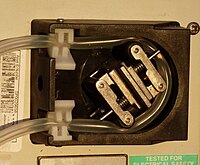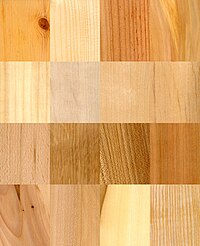
Comparative study of daytime and nighttime sap flow of Populus euphratica
Sign Up to like & getrecommendations! Published in 2017 at "Plant Growth Regulation"
DOI: 10.1007/s10725-017-0263-6
Abstract: In order to quantify and characterize the variance in desert riparian forest tree sap flow, we measured the sap flow from Populus euphratica and compared the daytime and nighttime patterns and responses to environmental variables.… read more here.
Keywords: nighttime sap; flow; sap flow; flow velocity ... See more keywords

Evaluating the effectiveness of urban trees to mitigate storm water runoff via transpiration and stemflow
Sign Up to like & getrecommendations! Published in 2017 at "Urban Ecosystems"
DOI: 10.1007/s11252-017-0693-y
Abstract: Many cities in the Eastern United States are working to increase urban tree cover due to the hydrological services that trees provide, including the interception, storage and transpiration of water that would otherwise enter sewer… read more here.
Keywords: stemflow; water; transpiration; sap flow ... See more keywords

Mitigating negative effects of long-term treated wastewater application via soil and irrigation manipulations: Sap flow and water relations of avocado trees (Persea americana Mill.)
Sign Up to like & getrecommendations! Published in 2020 at "Agricultural Water Management"
DOI: 10.1016/j.agwat.2020.106178
Abstract: Abstract Recent studies have shown significant negative effects of long-term irrigation with treated wastewater (TWW) on performance of orchards planted on clay soil. The aim of this study was to evaluate water use and water… read more here.
Keywords: irrigation; tww; water; long term ... See more keywords

Root sap flow as a tool to establish hydrological thresholds for plant growth and survival
Sign Up to like & getrecommendations! Published in 2020 at "Agricultural Water Management"
DOI: 10.1016/j.agwat.2020.106388
Abstract: Abstract Water saving technologies are important for sustainable agriculture and forestry. Recent research indicates that the plant itself may alternate between several natural water sources to survive drought. Therefore, a key issue is how to… read more here.
Keywords: sap flow; water; growth; plant ... See more keywords

Are Dracaena nebulophytes able to drink atmospheric water
Sign Up to like & getrecommendations! Published in 2017 at "Environmental and Experimental Botany"
DOI: 10.1016/j.envexpbot.2017.04.005
Abstract: Abstract In arid and semi-arid environments, fog interception as a water acquisition mechanism has been long recognized as an important factor for plant survival. The “narrow-leaf syndrome” increases water absorption from horizontal precipitation and is… read more here.
Keywords: dracaena; water; dracaena nebulophytes; sap flow ... See more keywords

Response of linden tree to nocturnal simulation of daylight conditions
Sign Up to like & getrecommendations! Published in 2021 at "Environmental and Experimental Botany"
DOI: 10.1016/j.envexpbot.2021.104477
Abstract: Abstract Although the importance of the internal clock for plant development and fitness was extensively studied in the last few decades, the majority of work was conducted in laboratory conditions using some small plants as… read more here.
Keywords: sap flow; linden tree; flow; response linden ... See more keywords

New design of external heat-ratio method for measuring low and reverse rates of sap flow in thin stems
Sign Up to like & getrecommendations! Published in 2018 at "Forest Ecology and Management"
DOI: 10.1016/j.foreco.2018.03.020
Abstract: Abstract Sap-flow techniques had limited application to thin-stemmed woody and herbaceous species and to diverse functional plant organs until the recent development of the external heat-ratio (EHR) method. Existing EHR techniques using miniature gauge configurations,… read more here.
Keywords: new design; sap flow; thin stems; external heat ... See more keywords

Sugar loading is not required for phloem sap flow in maize plants.
Sign Up to like & getrecommendations! Published in 2022 at "Nature plants"
DOI: 10.1038/s41477-022-01098-x
Abstract: Phloem transport of photoassimilates from leaves to non-photosynthetic organs, such as the root and shoot apices and reproductive organs, is crucial to plant growth and yield. For nearly 90 years, evidence has been generally consistent… read more here.
Keywords: pressure; flow; phloem; sap flow ... See more keywords

Heat tracer-based sap flow methods for tree transpiration measurements: A mini review and bibliometric analysis.
Sign Up to like & getrecommendations! Published in 2022 at "Journal of experimental botany"
DOI: 10.1093/jxb/erac424
Abstract: Plant transpiration is one of the main water flux components on the earth's land surface. Accurate measurement of plant transpiration is critical to better understand plant water use, to develop water management strategies, and to… read more here.
Keywords: htsf methods; transpiration; analysis; plant ... See more keywords

Bark and sapwood water storage and the atypical pattern of recharge and discharge of water reservoirs indicate low vulnerability to drought in Araucaria Araucana.
Sign Up to like & getrecommendations! Published in 2022 at "Tree physiology"
DOI: 10.1093/treephys/tpac113
Abstract: Stored water in inner tissues influences the plant water economy, which might be particularly relevant for trees facing increasing dry conditions due to climate change. We studied the water storages in the inner bark and… read more here.
Keywords: water; bark sapwood; sapwood; inner bark ... See more keywords

Microenvironment in the canopy rivals the host tree water status in controlling sap flow of a mistletoe species
Sign Up to like & getrecommendations! Published in 2017 at "Tree Physiology"
DOI: 10.1093/treephys/tpx018
Abstract: Mistletoes absorb water from the vascular system of their hosts and thus the water use of mistletoes can be influenced by the water status of their hosts besides abiotic environmental conditions; however, there is a… read more here.
Keywords: mistletoe; water; water status; sap flow ... See more keywords